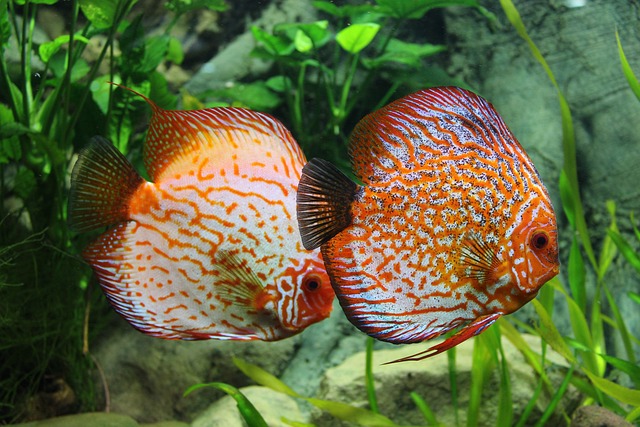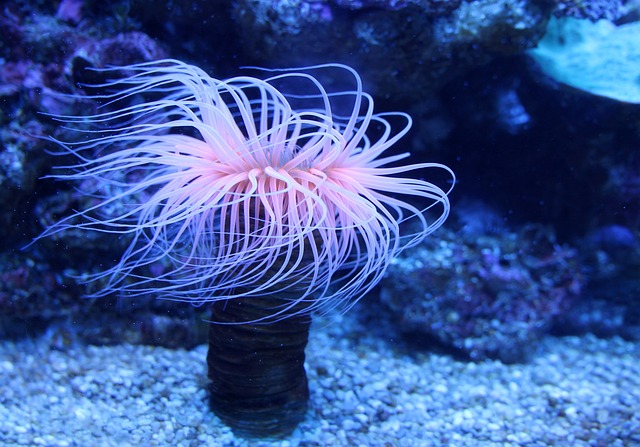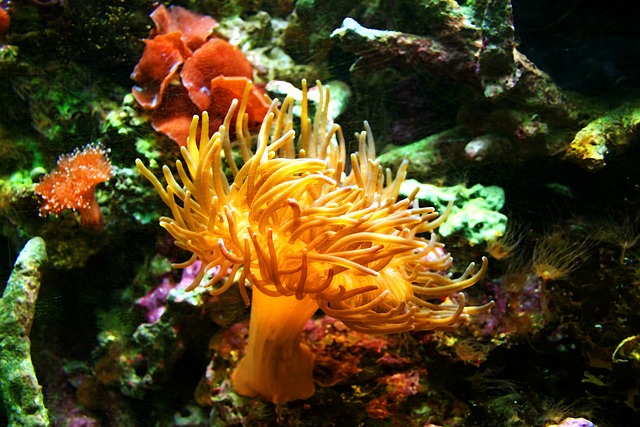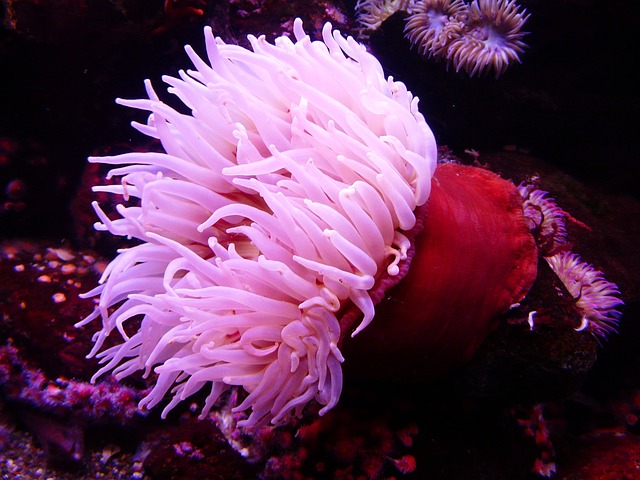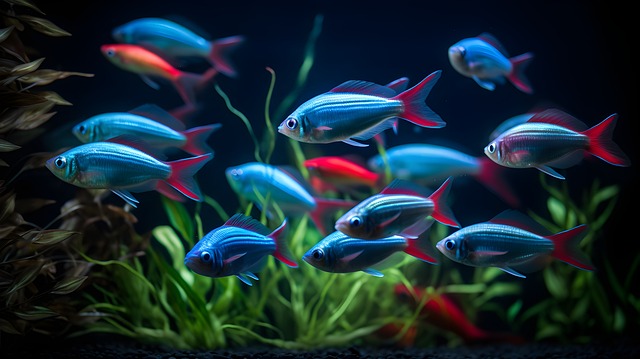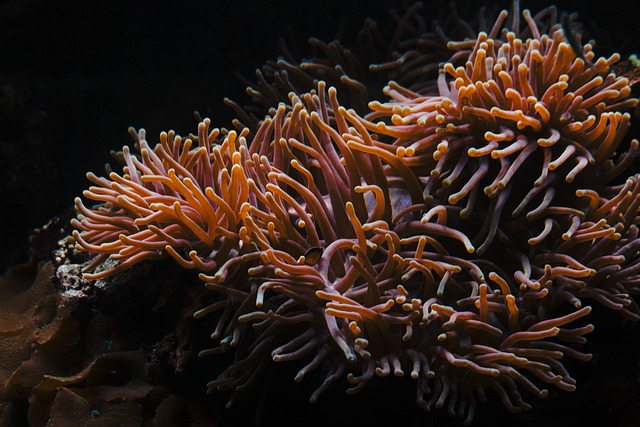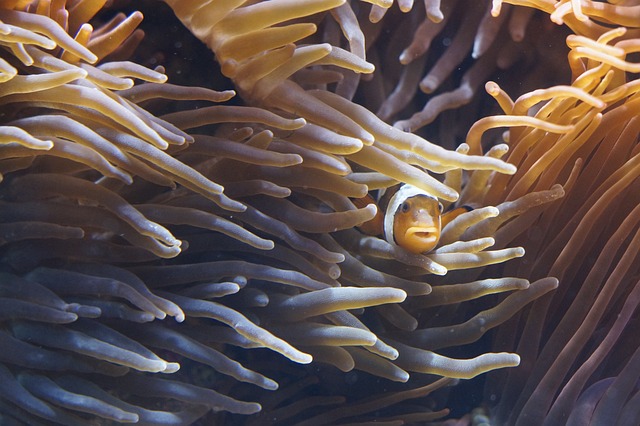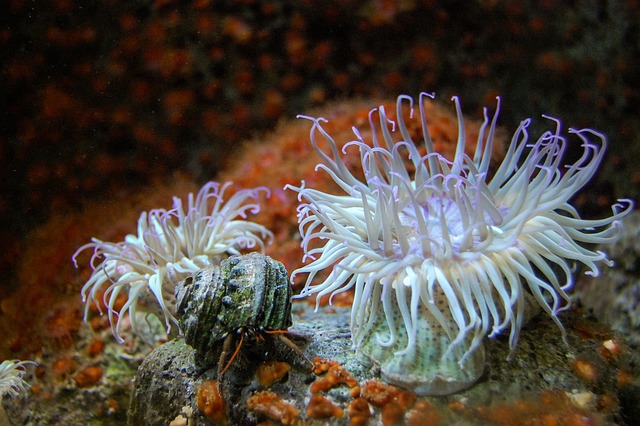Clown Loaches and Discus Fish can coexist in the same aquarium, but it’s essential to consider a few things when considering this combination.
- First, Clown Loaches are known to be active and playful Fish that enjoy swimming around and exploring their environment. On the other hand, Discus Fish are more sedentary and prefer to spend their time hiding in plants or other decorations. Therefore, providing plenty of hiding spots and plant cover for the Discus Fish to feel secure is essential.
- Second, Clown Loaches are known to be bottom feeders and will often scavenge for food on the aquarium floor. This can create competition with the Discus Fish, who also feed on the bottom. To avoid this, make sure to provide plenty of food for both species and ensure that the Clown Loaches don’t hog all the food.
- Finally, it’s important to consider the size of the aquarium. Both Clown Loaches and Discus Fish can grow quite large, so providing enough space for both species to swim and explore comfortably is essential.
With proper care and attention, Clown Loaches and Discus Fish can coexist in the same aquarium.
In this article, we will discuss the compatibility of clown loaches and discus fish and the factors that should be considered when keeping them together.
We will also provide tips for creating a suitable environment for both species and advise on maintaining a healthy and harmonious community tank.
Compatibility of Clown Loaches and Discus Fish
Clown loaches are often a popular option when considering tank mates for discus fish. However, it is essential to consider the compatibility of these two species before adding them to the same aquarium.
Tank Requirements
Both clown loaches and discus fish have specific tank requirements that must be met for them to thrive. Clown loaches require a minimum tank size of 75 gallons, while discus fish require a minimum tank size of 50 gallons.
The tank should be well-filtered, and the water parameters should be closely monitored to remain stable.
When keeping clown loaches and Discus Fish together, providing plenty of hiding places and territories for each species is important
. Clown loaches are known to be active and playful, while discus fish tend to be more peaceful and prefer a calm environment.
Dietary Needs
Clown loaches are omnivores and require a varied diet, including plant and animal matter. They will readily accept a variety of prepared foods, as well as live and frozen foods.
On the other hand, discus fish are primarily carnivores and require a diet high in protein. They will accept a variety of prepared foods, as well as live and frozen foods.
When feeding clown loaches and Discus Fish together, ensuring that each species receives the appropriate diet is essential. This may require feeding them separately or providing a variety of foods that meet the needs of both species.
Behavioral Traits
Clown loaches are known for their playful and active behavior, while discus fish are more peaceful and prefer a calm environment.
While these two species can coexist in the same tank, it is essential to monitor their behavior to ensure that they are not competing for resources or causing stress to one another.
Clown loaches and discus fish can be compatible tank mates if their specific tank requirements and dietary needs are met.
However, it is essential to carefully monitor their behavior and make adjustments as necessary to ensure their continued health and well-being.
Potential Challenges in Keeping Clown Loaches with Discus Fish
When considering keeping clown loaches with discus fish, there are a few potential challenges that should be taken into account.
Clown loaches are active and playful Fish that can sometimes become aggressive towards other Fish in their territory.
On the other hand, Discus fish are known for their calm and peaceful demeanor. As such, it is essential to consider the compatibility of these two species before introducing them to the same tank.
One potential challenge in keeping clown loaches with discus fish is that they can sometimes become territorial and aggressive towards other Fish in their environment.
This can lead to stress and potential harm to the discus fish. Additionally, clown loaches are known to be bottom-dwellers, while discus fish tend to occupy the middle and upper levels of the tank.
This can lead to competition for space and potential conflicts between the two species.
Another potential challenge is that clown loaches require different water conditions than discus fish.
Clown loaches prefer slightly cooler water with a pH between 6.0 and 7.5, while discus fish prefer warmer water between 6.0 and 6.5.
This can make it difficult to maintain ideal water conditions for both species in the same tank.
Finally, it is essential to consider the size of the tank when keeping clown loaches with discus fish.
Clown loaches can grow up to 12 inches, while discus fish typically reach a maximum length of 8 inches. As such, a larger tank is required to accommodate both species comfortably.
Overall, while it is possible to keep clown loaches with discus fish, it is essential to carefully consider the potential challenges and ensure that the tank is correctly set up and maintained to meet the needs of both species.
Tips for Successful Co-habitation
When considering keeping clown loaches and Discus Fish together, there are a few tips to keep in mind to ensure successful co-habitation.
Firstly, it is essential to note that clown loaches and discus fish have different environmental requirements.
Clown loaches prefer a pH range of 6.5-7.5 and a temperature range of 75-86°F, while discus fish prefer a pH range of 5.5-7.0 and a temperature range of 82-86°F.
Therefore, it is crucial to maintain a stable and suitable environment for both species.
Secondly, it is recommended to introduce clown loaches to the aquarium before adding discus fish. This allows the clown loaches to establish their territory and reduces the likelihood of aggression towards the discus fish.
Thirdly, ensuring the aquarium is spacious enough to accommodate both species is essential. Clown loaches are active swimmers and require plenty of space to move around, while discus fish prefer a more sedentary lifestyle and need space to establish their territory.
Fourthly, providing plenty of hiding places and decorations in the aquarium is crucial. This allows both species to establish territories and reduces the likelihood of aggression.
Finally, it is essential to monitor the behavior of both species regularly. Separating the Fish into different aquariums may be necessary if any signs of aggression or stress are observed.
With proper care and attention, clown loaches and discus fish can co-habit successfully in the same aquarium.
Similarities Between Clown Loaches and Discus Fish
Clown loaches and discus fish are both popular choices for aquarium enthusiasts. While they come from different regions, they share similarities that make them compatible tankmates. Here are some of the similarities between clown loaches and discus fish:
1. Water Conditions
Both clown loaches and discus fish require similar water conditions to thrive. They prefer soft, slightly acidic water with a pH range of 6.0-7.0. They also need a temperature range of 78-84°F. Keeping the water parameters consistent is crucial for their health and well-being.
2. Diet
Clown loaches and discus fish have similar dietary requirements. They are omnivores and enjoy a varied diet of high-quality pellets, flakes, and frozen or live foods. It is essential to provide a balanced diet to ensure they receive all the necessary nutrients.
3. Behavior
Both clown loaches and discus fish are peaceful species that prefer to live in groups. Clown loaches are known for their playful and active behavior, while discus fish are more docile and calm. They both appreciate having plenty of hiding spots and places to explore in their aquarium.
4. Size
Clown loaches and discus fish can grow to a similar size, with clown loaches reaching up to 12 inches and discus fish up to 8 inches. It is essential to consider the size of the aquarium when keeping these species together. A larger tank is necessary to provide enough swimming space and to prevent overcrowding.
Overall, clown loaches and discus fish have similarities, making them compatible tank mates. As long as the water conditions and tank size are appropriate, they can live together peacefully and provide a visually stunning display in any aquarium.
Differences Between Clown Loaches and Discus Fish
Clown loaches and discus fish are two popular species of freshwater fish that are often kept in aquariums. While they may look similar at first glance, several key differences between the two make them better suited for different types of aquariums.
One of the most apparent differences between clown loaches and discus fish is their size. Clown loaches can grow up to 12 inches long, while discus fish typically only reach 6 inches. This means that clown loaches require a much larger aquarium than discus fish, as they need more space to swim and explore.
Another difference between the two species is their temperament. Clown loaches are known for their playful and social nature and often swim in groups. Discus fish, on the other hand, can be more territorial and aggressive, especially during breeding season.
Regarding diet, clown loaches are omnivores and will eat various foods, including pellets, flakes, and live or frozen foods. On the other hand, Discus Fish are primarily carnivores and require a diet high in protein.
Finally, clown loaches and discus fish have different water requirements. Clown loaches prefer slightly acidic water with a pH between 6.0 and 7.5, while discus fish require soft, acidic water with a pH between 6.0 and 6.5.
While clown loaches and discus fish can be great additions to an aquarium, it’s essential to consider their needs and behaviors before deciding whether or not to keep them together.
Conclusion
In conclusion, keeping clown loaches and Discus Fish together in the same tank is not recommended. Although both species are peaceful, they have different water parameter requirements, and their diets are incompatible.
Clown loaches prefer a pH range of 6.0-7.5, while discus fish require a pH range of 6.0-6.5. Clown loaches also prefer harder water with a higher mineral content, while discus fish thrive in soft water with a lower mineral content. These differences in water parameters can cause stress and health problems for both species.
Furthermore, clown loaches are omnivores and enjoy a varied diet that includes live and frozen foods, while discus fish are primarily herbivores and require a diet rich in plant-based foods. Feeding both species together can be challenging, and one species may end up dominating the food source, leading to malnutrition for the other.
Overall, keeping clown loaches and discus fish in separate tanks is best to ensure they receive the proper care and environment they need to thrive.

